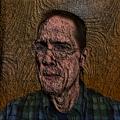1) "Janáček composed his little symphony in 1926. He originally wrote the opening as a fanfare for a gymnastics festival. Aomame imagined 1926 Czechoslovakia: The First World War had ended, and the country was freed from the long rule of the Hapsburg Dynasty. As they enjoyed the peaceful respite visiting central Europe, people drank Pilsner beer in cafés and manufactured handsome light machine guns. Two years earlier, in utter obscurity, Franz Kafka had left the world behind. Soon Hitler would come out of nowhere and gobble up this beautiful little country in the blink of an eye, but at the time no one knew what hardships lay in store for them. This may be the most important proposition revealed by history: 'At the time, no one knew what was coming.'"
2) "I'm here, but I'm not here. I'm in two places at once. It goes against Einstein's theorem, but what the hell. Call it the Zen of the killer."
3) "'Hmm. Real life is different from math. Things in life don't necessarily flow over the shortest possible route. For me, math is—how should I put it?—math is all too natural. It's like beautiful scenery. It's just there. There's no need to exchange it with anything else. That's why, when I'm doing math, I sometimes feel I'm turning transparent. And that can be scary.'
Fuka-Eri kept looking straight into Tengo's eyes as if she were looking into an empty house with her face pressed up against the glass.
Tengo said, 'When I'm writing a story, I use words to transform the surrounding scene into something more natural for me. In other words, I reconstruct it. That way, I can confirm without a doubt that this person known as 'me' exists in the world. This is a totally different process from steeping myself in the world of math.'
'You confirm that you exist,' Fuka-Eri said.
'I can't say I've been one hundred percent successful at it,' Tengo said."
4) "'I am not a professional, or a pervert, just an ordinary citizen. An ordinary citizen who wants nothing more than to have intercourse with a member of the opposite sex. There's nothing special about me. I'm totally normal.'"
5) "'Do you give them names?' Aomame asked, curious. 'Like dogs or cats?'
The dowager gave her head a little shake. 'No, I don't give them names, but I can tell one from another by their shapes and patterns. And besides, there wouldn't be much point in giving them names: they die so quickly. These people are your nameless friends for just a little while. I come here every day, say hello to the butterflies, and talk about things with them. When the time comes, though, they just quietly go off and disappear. I'm sure it means they've died, but I can never find their bodies. They don't leave any trace behind. It's as if they've been absorbed by the air. They're dainty little creatures that hardly exist at all: they come out of nowhere, search quietly for a few, limited things, and disappear into nothingness again, perhaps to some other world.'"
6) "Of course, it's all just a hypothesis, Aomame told herself as she walked. But it's the most compelling hypothesis I can produce at the moment. I'll have to act according to this one, I suppose, until a more compelling hypothesis comes along. Otherwise, I could end up being thrown to the ground somewhere. If only for that reason, I'd better give an appropriate name to this new situation in which I find myself. There's a need, too, for a special name in order to distinguish between this present world and the former world in which the police carried old-fashioned revolvers. Even cats and dogs need names. A newly changed world must need one, too.
1Q84—that's what I'll call this new world, Aomame decided.
Q is for 'question mark.' A world that bears a question."
7) "Some time had to pass before she was able to grasp what the difference was. And even after she had grasped it, she had to work hard to accept it. What her vision had seized upon, her mind could not easily confirm.
There were two moons in the sky—a small moon and a large one. They were floating there side by side. The large one was the usual moon that she had always seen. It was nearly full, and yellow. But there was another moon right next to it. It had an unfamiliar shape. It was somewhat lopsided, and greenish, as though thinly covered with moss."
8) "With his penis still resting on the palm of her hand, Tengo began to speak. 'The story is about me—or about somebody modeled on me.'
'I'm sure it is,' she said. 'Am I in it?'
'No, you're not. I'm in a world that isn't here.'
'So I'm not in the world that isn't here.'
'And not just you. The people who are in this world are not in the world that isn't here.'
'How is the world that isn't here different from this world? Can you tell which world you're in now?'
'Of course I can. I'm the one who's writing it.'
'What I mean is, for people other than you. Say, if I just happened to wander into that world now, could I tell?'
'I think you could,' Tengo said. 'For example, in the world that isn't here, there are two moons. So you can tell the difference.'"
9) "'They have been called by many different names, but in most cases have not been called anything at all. They were simply there. The expression 'Little People' is just an expedient. My daughter called them that when she was very young and brought them with her.'
'Then you became a king.'
The man drew a strong breath in through his nose and held it in his lungs for a time before releasing it slowly. 'I am no king. I became one who listens to the voices.'
'And now you are seeking to be slaughtered.'
'No, it need not be a slaughter. This is 1984, and we are in the middle of the big city. There is no need for a brutal, bloody killing. All you have to do is take my life. It can be neat and simple.'"
10) "Outside the window, the thunder-without-lightning rumbled with increased force. Raindrops pelted the glass. The two of them were in an ancient cave—a dark, damp, low-ceilinged cave. Dark beasts and spirits surrounded the entrance. For the briefest instant around her, light and shadow became one. A nameless gust of wind blew through the distant channel. That was the signal. Aomame brought her fist down in one short, precise movement.
Everything ended in silence. The beasts and spirits heaved a deep breath, broke up their encirclement, and returned to the depths of a forest that had lost its heart."
11) "Ushikawa left his camera, leaned back against the wall, and looked up at the stained ceiling. Soon everything struck him as empty. He had never felt so utterly alone, never felt the dark to be this intense. He remembered his house back in Chuorinkan, his lawn and his dog, his wife and two daughters, the sunlight shining there. And he thought of the DNA he had given to his daughters, the DNA for a misshapen head and a twisted soul."
12) "His father's passing didn't particularly shock Tengo. He had spent two solid weeks beside his unconscious father. He already felt that his father had accepted his impending death. The doctors weren't able to determine what had put him into a coma, but Tengo knew. His father had simply decided to die, or else had abandoned the will to live any longer. To borrow Kumi's phrase, as a 'single leaf on a tree,' he turned off the light of consciousness, closed the door on any senses, and waited for the change of seasons."
13) "Aomame mourned the deaths of these two friends deeply. It saddened her to think that these women were forever gone from the world. And she mourned their lovely breasts—breasts that had vanished without a trace."



